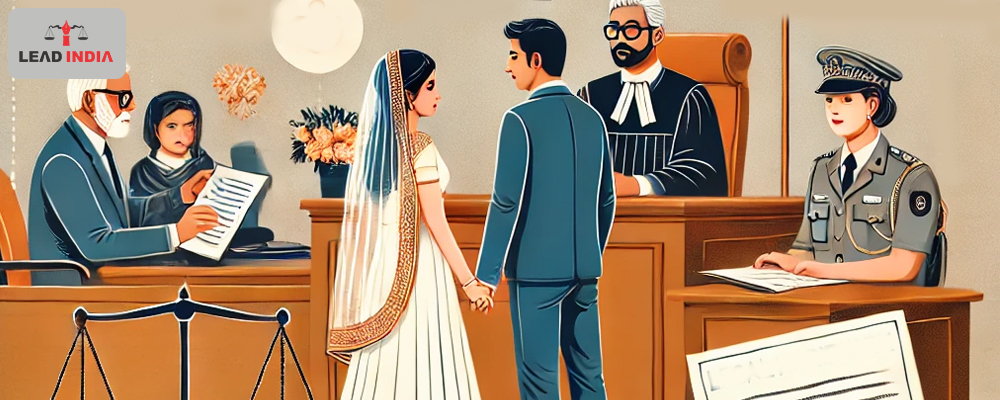In Indian society, marriage is a sacred institution and a significant event. It marks the commencement of a joint life of two persons. In India, marriages are solemnized in a number of ways, such as religious, court, or civil unions. Court marriages are among the most popular and increasingly preferred options for many who would rather undergo a formal, legal, and simplified marriage process.
Court marriages are conducted under the Special Marriage Act, of 1954, and are characterized by the fact that people of different religions, castes, and backgrounds can marry under this law. Although court marriage is a simpler and legal procedure, it is wise to shore up several precautionary measures before proceeding to get a legally valid, complication-free married life that provides personal and legal security.
Need A Legal Advice
The internet is not a lawyer and neither are you. Talk to a real lawyer about your legal issue

Legal Requirements of Court Marriages
Firstly, one should be acquaint with the legal requirements and procedures for a court marriage. Court marriage in India can be solemnize under the Special Marriage Act, of 1954, the Hindu Marriage Act of 1955, and the Muslim Marriage Act of 1939 which allows a couple of any religion and social background to marry without necessarily following any ritual of one religion or the other.
Some of the most common legal requirements for the court marriage are:
- Age Requirement: A person to marry should be of legal age. The legal minimum age for marriage is 21 years for males and 18 for females in India.
- Consent: The parties should mutually agree to marry and shall do so with free consent without any form of coercion.
- Witnesses: Three witnesses must be present at the time of marriage.
- Notice of Intended Marriage: Submission of a notice application with the marriage registrar declaring intention to marry; the same will be display publicly for thirty days at the registrar’s office, where he or she will be allow to raise objections.
- Document Submission: The two persons interested in getting marry should submit proof documents such as proof of age, proof of residence, photographs, and a divorce certificate (if applicable).
Safety Measures to be Take Before Court Marriage
Getting Your Documents in Order:
The process may require the production of certain prescribed documents for marriage registration under the Special Marriage Act. Any missing or incomplete documentation of such prescribed documents may delay or even reject the marriage application.
The following are the documents need:
- Identity Proof: Any one government photo ID like an Aadhar card, driving license, or passport.
- Age proof: Birth certificate, school leaving certificate, government-issued documents stating the age of the persons.
- Address Proof: Utility bills, bank statements, or rent receipts that show where the persons live.
- Passport-sized Photographs: A few passport-sized photographs of the parties.
- Divorce/Death Certificate (if applicable): If either party has been previously marry, a divorce decree or death certificate of the partner must be provide.
Caution about the Waiting Period:
Once the notice of intend marriage is fill, there is a mandatory waiting period of 30 days in the case of the Special Marriage Act before the marriage can be solemnize. The purpose of this waiting period is to allow for raising any objections. To mitigate the risk of facing any objections, the couple must:
- Assure that both parties are consenting adults and there are no impediments by law (such as existing marriages or blood relations).
- Be in constant communication with their families to thwart any family-induced objections.
- Be prepare for the possibility of applying to a court for relief by injunction or otherwise.
Seek Legal as well as Financial Advice:
It is advisable to get some legal and financial advice before going ahead with a court marriage. The best possible understanding of the legal implications involve in marriage should be avail, especially about laws on property rights, inheritance, and other financial matters. A good lawyer can help to enlighten a couple on the following aspects.
- Prenuptial agreements: Prenuptial agreements are not common in India, but for those wishing to delineate how assets would be handle in a post-divorce or separation scenario, there is always the option.
- Joint Ownership of Property: It would be prudent to know how the property would be own as they enter into marriage, especially when it comes to the contribution of each party, given that both have some assets before marriage.
- Tax Implications: The impact of marriage on the individual tax filings of a person availing the marriage may be look at by approaching a financial expert who can help manage the tax-related issues that may crop up after marriage.
Consult Family and Friends to Seek Support:
While court marriage is usually a formal and legal process for most, emotionally and socially, family and close friends should also be include in the decision. Marriage such as this is frown upon in most Indian communities, it is an arranged marriage that really can breed misunderstanding or opposition if that happens.
To make a smoother transition:
- Open discussions with family members to ensure they understand and support the decision to marry in court.
- Tell close friends about the wedding by sharing some joy and ensuring that they will be available for attendance, as necessary.
- Discuss with valuable people regarding the different cultural or social implications that can affect the marriage.
One can talk to a lawyer from Lead India for any kind of legal support. In India, free legal advice online can be obtain at Lead India. Along with receiving free legal advice online, one can also ask questions to the experts online for free through Lead India.





 Talk to a Lawyer
Talk to a Lawyer